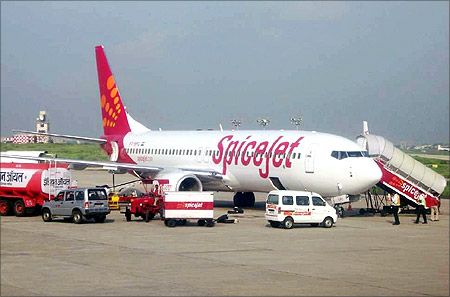 The prospective owners of Indian low-cost carrier SpiceJet Ltd plan to cut the airline's fleet, shrink its network and return to a "plain vanilla" business model to achieve profitability, two people close to the investors said.
The prospective owners of Indian low-cost carrier SpiceJet Ltd plan to cut the airline's fleet, shrink its network and return to a "plain vanilla" business model to achieve profitability, two people close to the investors said.
Their plans include culling the 15 Bombardier Q400 regional aircraft from the airline's fleet and sticking to Boeing 737 narrow body jets, and focusing on profitable services to and between India's major cities, said the sources.
SpiceJet said on Thursday that Ajay Singh, who helped found the airline in 2005, has agreed to buy a controlling stake from billionaire majority owner Kalanithi Maran's Sun Group.
He was expected to submit his plan, which could involve an investment of $240 million, by the end of January. The plan would need regulatory approval.
Singh told Reuters on Thursday the airline could break even in the next financial year by keeping its costs low and taking advantage of low oil prices.
"SpiceJet has excellent service standards and on-time performance, but it became too complex. It added a second type of aircraft and served too many new markets. This came at a very high cost," said one source familiar with Singh's plans.
"It should aim for a plain vanilla business with only one type of aircraft, a lean workforce and a focus on low costs. That is why IndiGo and AirAsia are successful."
Low-cost carrier IndiGo is India's biggest airline. Indigo, GoAir and the Indian affiliate of Malaysian budget carrier AirAsia have all charted aggressive expansion plans and could benefit from a smaller SpiceJet, given that fares are likely to go up.
Singh could not be reached for comment on Friday. The sources did not want to be identified as the plan was not public.
Fleet Grounded Briefly
Maran and the Sun Group have been actively looking for an investor, with the airline losing money for the last five quarters. It has not been profitable on a full-year basis since the 12 months ending March 2011, a year after Maran took over.
Last month, it looked to be on the verge of collapse after a cash crunch and was forced to briefly ground its fleet.
Its woes reflect the broader Indian aviation industry where, apart from IndiGo, airlines have found it hard to make money despite rising passenger numbers and a large and increasingly affluent and mobile population.
SpiceJet, which has reduced its daily flights by a third since September to 230 a day, could also cull its workforce of 5,000.
The number of 737s in active service with SpiceJet has fallen to 17 from 31 at the start of 2013. It was due to receive eight 737s in 2015, but those could be deferred.
The airline, Boeing's only low-cost customer in India, is also due to take delivery of another 42 upgraded 737 Max jets from 2018 to replace its existing planes.









